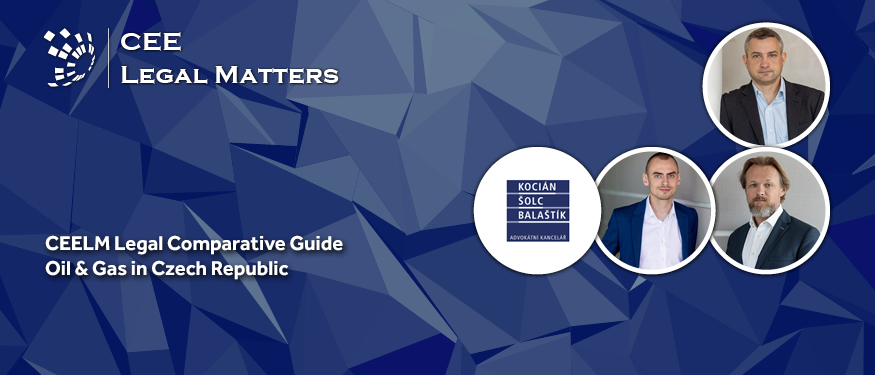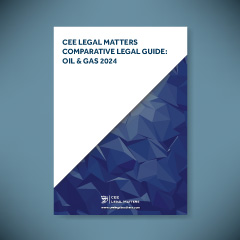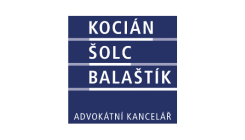Contributed by Kocian Solc Balastik.
- SUMMARY
The Czech Republic, as a transit country for supplies of natural gas from Russia to Europe, has experienced significant changes after the Russian invasion of Ukraine. Due to its very limited deposits of oil & gas and long-term structural dependence on imports from the Russian Federation, the Czech Republic has been making considerable efforts to ensure supplies from other markets.
Following the 40% annual decrease in gas imports from the Russian Federation in 2022, the Czech Republic has partially replaced Russian imports with natural gas from Norway and LNG from the Netherlands and Belgium. Entities (co)owned by the Czech Republic have also rented extensive capacity in the LNG terminals in the Baltics.
In order to maintain its relevance, the Czech Republic has no other option but to promote its status as a transit country and reap the benefits accordingly. The position might be advantageous while building a hydrogen corridor, as hydrogen holds considerable potential for the future as one of the means leading to transfer to a carbon-free economy. In any case, natural gas itself is expected to remain an important fuel as it is an important fossil fuel in the transformation of the Czech energy sector given the gradual and promoted decrease in coal use and the use of oil products in transport.
- OVERVIEW OF THE COUNTRY'S OIL & GAS SECTOR
- Legal framework-a brief outline of your jurisdiction's oil & gas sector
In terms of mining, the exploitation of natural gas is guided by Act No. 44/ 1988 Coll. on the protection and utilization of mineral resources (the Mining Ad). The same act applies to the extraction and exploitation of oil. The Czech Mining Authority is in charge of the enforcement of the law.
The key legislative framework regarding the trade is laid down in Act No. 458 / 2000 Coll. (the Energy Act) on business conditions and state administration in the energy sector. Under the Energy Act and other regulations, the Ministry of Industry and Trade is the public authority responsible for ensuring the fulfillment of obligations arising from international agreements and treaties. The Energy Regulatory Office (ERO), the market regulator, is responsible for the oversight and economic regulation of the energy sector. ERO sets regulations under the Energy Act. The market operator, OTE, carries out its activities under a license awarded by the ERO and operates the Czech gas and electricity markets. NET4GAS, a company that holds the exclusive gas transmission system operator license (i.e., the license for TSO) and operates pipelines for international transit and national transmission of natural gas, has been recently acquired by the Czech Republic (indirectly, via the state-owned company CEPS) to further stabilize and protect the Czech gas market after the Russian invasion of Ukraine. At the distribution level, tens of companies hold a distribution system operator license (i.e., the license for DSO). As to the trade with oil/petroleum products the specific conditions under the Act. No. 455 / 1991 Coll. (the Trade Licensing Act), apply.
There were some attempts regarding shale gas exploration and production but they were definitely abandoned in 2015 for the risks to the environment were evaluated as excessively high. In addition, the missing gas pipeline interconnections with Poland and Austria discussed for over 10 years have been further postponed and possibly abandoned.
- Domestic oil & gas production and imports/exports
The share of natural gas in total energy consumption is consistently, with the exception of the year 2022, around 20%. Domestic natural gas production in the Czech Republic is negligible and accounts for approximately 1-2% of the domestic demand. The rest of the gas supply is imported via transit systems and pipeline interconnections, located in particular in Germany. Natural gas is to this day mainly imported from the Russian Federation, albeit the supply from Norway, and has been steadily increasing. Exports of natural gas are negligible. However, the country is an important transit corridor for Russian natural gas into CEE and Western European markets.
The Czech Republic does not have substantial crude oil resources. Domestic production covers only approximately 3% of domestic consumption and is on a decrease since the identified domestic crude oil reserves are expected to be depleted in the next two decades. The country exports marginal amounts of crude oil to neighboring countries. The share of oil in total final consumption is around 30%. The Czech Republic has two major crude oil pipelines - the Druzhba pipeline and the IKL (Ingolstadt - Kralupy - Litvinov) pipeline - both of which are owned, operated, and managed by the state-owned company MERO. The country´s goal is to reduce oil consumption in accordance with the country´s (and EU's) policy to reduce greenhouse gas emissions, by promoting the development of low-emission mobility. The country is expected to gradually reduce import dependency on petroleum products and on the other hand increase product exports, particularly to Central and Eastern Europe. In order to enhance the country's oil security, the diversification of crude oil import routes and cross-border coordination with the neighboring countries is being encouraged.
- Foreign investment and participation
Pursuant to Act No. 34/ 2021 Coll., Foreign Investments Screening Act, investments funded by non-EU entities must in certain cases approved by the local authorities. The act´s goal is to enable assessment of whether foreign investments might have a negative effect on the security of the Czech Republic or its internal or public order, including impact on critical infrastructure, key technologies, and other important entries, which are key from the security perspective (oil & gas sector not excluded). It establishes the rights and duties of foreign investors, whose ultimate beneficial owner is from non-EU countries. As a consequence, it may hinder the implementation of foreign investments in the Czech Republic if these are evaluated by the relevant authorities as high-risk.
In respect of individual persons or legal entities, foreign investments may also be prohibited by sanctions applied by the EU or the Czech Republic primarily toward Russian and Belarussian stakeholders.
- Protection of investment
As an EU member, the Czech Republic is bound to implement and follow the EU legislation in the oil & gas sector. Furthermore, several international treaties on environmental protection apply. Crucial regarding the protection of investments is that the Czech Republic, as an EU member state, must comply with the commitments under the treaties together known as the Energy Charter. However, the coordinated withdrawal from the charter has been approved by both the European Commission and the European Parliament, and most of the EU countries will presumably withdraw from the charter by the end of 2024.
- EXPLORATION OF OIL & GAS
- Granting of oil & gas exploration rights
Reserved mineral mining, including oil & gas, is allowed only upon government authorization in the form of a license for mining activities, granted by the relevant local mining authority, and only on the mining areas approved by the relevant local mining authority. An application for mining area approval is processed by the relevant local mining authority only with the consent of the Ministry of the Environment and the Ministry of Industry and Trade. Administrative proceedings concerning the establishment of mining areas and issuing licenses for mining activities follow rules stipulated by the Mining Act, Act No. 61 / 1988 Coll., on Mining Activities (Mining Activities Ad) and Act. No. 500 / 2004 Coll., the Administrative Code; any party to such proceedings can file an appeal against the issued administrative decisions to the Czech Mining Authority, which is the supreme body of the Czech state mining administration.
- Foreign exploration
EU entities enjoy the same treatment as Czech companies, see Section 3.1. Non-EU entities are also treated the same way as Czech entities, provided that foreign investment is not forbidden by the Foreign Investments Screening Act or the applicable sanctions, see Section 2.3.
- Stages of the exploration process
As to the stages of the exploration process, these are rather complex. To simplify, an entity is authorized to mine the reserved minerals, provided it has obtained (i) a decision on the determination of the exploration area according to the Act No. 62/ 1988 Coll; Geological Works Act; (ii) obtained a certificate of exclusive deposit according to the provisions of Section 6 of the Mining Act; (iii) meets the conditions stipulated under the Mining Act and obtained authorization to mine the exclusive deposit of a particular mineral under Section 24 et seq. of the Mining Act; (iv) as well as a permit for opening, preparation, and mining within the meaning of Section 10 of the Mining Act. Further details and specific conditions are stipulated in the Mining Act, Mining Activities Act, Geological Works Act, and implementing legislation.
- Obligatory state participation
According to the Mining Act, the deposits of reserved minerals are referred to as mineral wealth, the owner of which is the state. The principle of state ownership of exclusive deposits is broken at the time of extraction of the minerals when ownership of the minerals passes to the relevant mining organization as a result of their extraction. Thus, the state grants the opportunity to extract its own minerals. To benefit from this arrangement, each licensed mining organization is obliged to pay an annual fee on the minerals extracted to the account of the relevant local mining authority under the conditions stipulated in the Mining Act.
- Risks to be considered
The entities seeking to explore and mine the oil & gas reserves must be aware that there is no legal claim for the respective license. The respective state authorities must take into account all the environmental and other risks; therefore, no license might be granted even after years of preparations.
- PRODUCTION OF OIL & GAS
- Granting of oil & gas production rights
Gas production is subject to a license granted under the Energy Act. The applicant for the production license must submit the following documents to ERO: an extract from the commercial or other registers, statement of criminal records of members of the statutory body and of the representative (who must be appointed), declaration of the representative's consent to be appointed as representative and their declaration that they are not appointed as a representative for the licensed activity by another license holder, and documents evidencing the financial and technical requirements (e.g. bank account statements and last annual balance sheet report). Members of the statutory body of the applicant must meet the following conditions: (i) minimum age of 18 years; (ii) full legal capacity; (iii) no criminal record; and (iv) the professional competence of the applicant for the license or the appointed responsible representative. The applicant is also obliged to hold the title to use the premises where its scat is located and needs to demonstrate its ability to provide sufficient funding to financially secure the activities for which the license is required as well as its ability to cover current and future liabilities for all the time the license is granted. The license shall be granted for a time period of up to 25 years.
An entity active in the oil/petroleum business must obtain a trade license if its activities in the territory of the Czech Republic are to be carried out on a permanent, continuous, and systematic basis, as well as independently, in one´s name, on one's account and in order to make a profit. Such an entity is obliged to apply for a tied trade license - "to manufacture and processing of fuels and lubricants and fuel distribution" - the granting of which is subject to the fulfillment of certain professional competence requirements. Recognition of professional qualifications obtained in another EU member state for licensed trades in the Czech Republic comes into consideration as well. The detailed conditions are stipulated in Act. No. 455 / 1991 Coll., Trade Licensing Act.
- Foreign production
A license for gas production cannot be obtained by a foreign company directly. Such entities must establish at least a local branch in the Czech Republic. Under Czech law, the branch itself does not have legal capacity, though, and carries out its business only as a part of the foreign company. The applicants for a trade license required from another EU member state may have the professional qualification recognized under the conditions of the Trade Licensing Act. A foreign investor may of course purchase a stake in a Czech company (or the entire company) that holds the necessary licenses.
- Stages of the production process
No separate stages apply, sec the general information above.
- Obligatory state participation
There is no obligatory state participation in the production of oil & gas. Generally, the benefits for the state arising are such that the foreign company that has a permanent establishment in the Czech Republic must establish a taxable presence in the country. A permanent establishment is defined by a tax treaty or by Act No. 586 / 1992 Coll., on Income Taxes, as amended; consequently, either a subsidiary registered in the Czech Republic or a local registered branch would generally be required to establish a taxable presence. In addition to the general tax liabilities, there is a special tax pursuant to Act No. 261 / 2007 Col., on Stabilization of Public Budgets. Gas producers are subject to this tax if they sell gas to the end-customer at the same time. The listed petroleum products are subject to the excise tax. Also, see Section 3.4.
- Risks to be considered
In this context, we should note that the procedure to obtain the respective production license is rather complex and time-consuming, and there is no claim for granting the necessary license. Otherwise, no particular risks arise.
- TERMINATION OF PRODUCTION OF OIL & GAS
- Abandonment and decommissioning
The Mining Act obliges the organizations holding the mining rights to ensure remediation, which includes the reclamation of all land affected by the mining and the monitoring of the site after its closure. The mining companies are primarily obliged to generate a financial reserve for the remediation and reclamation of areas affected by mining. Its amount must correspond to the rehabilitation and reclamation needs of all the land disturbed during mining activities. Financing of the reclamation activities is then provided in two ways: (i) from the mandatory financial reserves, and (ii) from levies on mining companies. According to the Mining Act, each licensed mining organization is obliged to pay an annual fee on the minerals extracted to the account of the relevant district mining authority. The particular conditions and amounts are provided in the Mining Act and implementing legislation.
- Environmental and HSE consideration
The Czech Mining Authority stipulates the conditions and enforces the compliance with occupational health and safety standards in the mining industry and when utilizing explosives based on the regulatory framework given in the Decree of the Czech Mining Authority No. 26 / 1989 Col/., on occupational health and safety and operational safety in mining and surface mining activities.
- SAFETY OF OIL & GAS EXPLORATION AND PRODUCTION
- International treaties to which the jurisdiction is a party
The Czech Republic's safety of oil & gas exploration and production regulation reflects the commitments established under the membership in the EU and in the International Energy Agency. Both contractual regimes stipulate, for instance, the obligation to maintain permanent stocks of crude oil and petroleum products. Further, the natural gas emergency response policies are in line with EU Regulation 2011/1938 concerning measures to safeguard the security of the gas supply. According to the regulation, every four years the Czech Republic must prepare risk assessments, a preventive action plan, and emergency plans as part of the emergency planning at national, regional, and EU levels.
- Offshore Safety Directive
The provisions of the Offshore Safety Directive are not in principle relevant for the Czech Republic as a landlocked country and it is as such not obliged to implement them (with some infrequent exceptions).
- IMPORT, EXPORT, AND SALES OF OIL & GAS
- Import and Export of oil & gas
As to the import and export of natural gas, pipelines for international transit are operated by NET4GAS which holds the exclusive gas transmission system operator license. There are seven high-pressure pipeline interconnection points between the gas transmission networks of the Czech Republic and its neighboring countries. Despite the recent war in Ukraine, the Czech gas transmission system continues to play an important role in supplying gas to Central and Eastern Europe as well as to Germany and Western Europe. There is no special legislation pertaining to cross-border natural gas transactions. In general, the cross-border market for natural gas is regulated by Regulation (EC) No. 715/2009 on conditions for access to the natural gas transmission networks. Cross-border sales and deliveries of natural gas are transacted pursuant to bilateral agreements between the parties and the availability of cross-border capacity.
The Czech Republic does not have any oil ports, but crude oil is supplied to the local refineries through two major crude oil pipelines connected with neighboring countries. The Czech Republic has been a net oil products importer but occasionally has exported to Austria, Hungary, and Poland.
- Transportation
The seven high-pressure pipeline interconnection points between the gas transmission networks of the Czech Republic and its neighboring countries are four with Germany, two with the Slovak Republic, and one with Poland. Please also see Section 7.1.
The Czech Republic has two major refineries (Kralupy and Litvinov). The oil security of the country is also backed by major oil storage facilities managed by two Czech state-owned enterprises. The transportation of crude oil for refining is provided by the state-owned MERO, which is the owner and operator of crude oil pipelines, including the Czech sections of the Druzhba and Ingolstadt-Kralupy-Litvínov (IKL) pipelines, and crude oil storage capacities. The network of product pipelines in the Czech Republic is exclusively owned and managed by CEPRO, which connects the main consumer regions, the oil storage and distribution centres of CEPRO, and the refineries in Litvinov, Kralupy, as well as in Bratislava, Slovak Republic. The Ministry of Finance has been the sole shareholder in the company since 2006. The 1,100-kilometer network enables direct pumping and supply between its individual nodes and is fully reversible.
- Land rights
Construction of any natural gas or oil transportation pipeline requires authorization from the Ministry of Industry and Trade. Compliance with the general rules stipulated in the recently adopted Act No. 283/2021 Coll., the Building Code is also required; the relevant administrative proceedings are held in the respective building offices, in particular permits for placement and construction of infrastructure projects significant in size and importance will be handled by the newly established Transport and Energy Building Authority. In addition, a license is required from the ERO in order to operate a natural gas transportation pipeline and storage facilities. The license for the transportation of natural gas is exclusive for the whole territory of the Czech Republic and the current license holder is NET4GAS. Transportation of oil is being operated by a few companies as well.
Under the Energy Act, a transportation (or storage) facility on third-party land may be constructed pursuant to a valid authorization of the project. However, the Energy Act also requires that a valid easement be concluded with the owner of the land in order to establish, reconstruct, repair, and operate the facilities in question. If such owner is unknown or an agreement is impossible to reach, the relevant construction authority can establish the easement under the conditions stipulated in Act No. 416 / 2009 Coll., on Accelerating the Construction of Transport, Water and Energy Infrastructure, and Act. No. 184/ 2006 Coll., on expropriation, in general, regulate the procedure in connection with facilitating and accelerating the construction of listed buildings that are of fundamental importance for the functioning of society, including the conditions for land expropriation, which is, however, considered to constitute a measure of last resort.
- Access and integration
Under Czech law, the operator of the natural gas transportation system is obliged to connect to the transportation system any party upon its request, which complies with the conditions stipulated by the Operation Rules of the Natural Gas Transportation System (the Operational Rules) and at the same time ensure non-discriminatory conditions for such access to the transportation system. Details are set forth in the Operational Rules, the Gas Market Rules, and the Operational Code of the Operator of the Transportation System. Similarly, the operator of the underground storage facilities has a duty to grant access to the relevant storage facility if the relevant conditions are met. As a result of this principle, a customer has the right to connect to the transportation (or distribution) system under certain conditions, and also any entity trading with natural gas is entitled to access to the transportation (or distribution) system, provided such entity is a party to a relevant written agreement. Any participant in the Czech gas market is entitled to use underground storage facilities as well, provided that there is a free storage capacity in the respective underground gas storage facility and such entity is a party to a relevant written storage agreement. The price for the transportation of natural gas is regulated by the ERO in its price decisions, which the ERO issues separately for individual years. The price for the storage of natural gas is not regulated.
The network of oil product pipelines in the Czech Republic is exclusively owned and managed by CEPRO, which connects the main consumer regions, the oil storage and distribution centres of CEPRO, and the refineries in Litvinov, Kralupy, as well as in Bratislava, Slovak Republic. The Czech product oil pipeline system still remains one of the most important European pipeline networks in terms of location and connections to the Slovak pipeline systems, despite the decline in demand for Russian oil transported by the Druzhba pipeline.
- Gas transmission and distribution
The Czech natural gas transmission network is divided into four branches: the Northern and Southern branches, which run from Lanzhot to the Czech-German borders; the Western branch, which connects the Northern and Southern branches; and the Moravian branch, which supplies the Moravian region (southeastern part of the country) and connects with Poland. These branches are well interconnected, except for North Moravia, which is only connected to the national transmission system via a single pipeline. Company NET4GAS holds the exclusive gas transmission system operator license (i.e., the license for TSO) and operates pipelines for international transit and national transmission of natural gas.
The Czech distribution network is mostly operated by three privately-owned distribution system operators, whose geographical area is clearly defined: Prazska Plynarenska Distribuce serves mostly the region of Prague; EG.D. (from the E.ON group) serves mostly the South Bohemia region; GasNet covers the rest of the Czech Republic. Most of the gas enters the distribution systems through transfer stations connected to the transmission system. A small part of the gas supply comes from domestic extraction and directly feeds into the distribution system. In order to ensure supply reliability, individual regional distribution systems are connected with other distribution systems.
- TRADING
- Trading license
Wholesale activities carried out in the territory of the Czech Republic are subject to licensing in the country if carried out: (i) on a permanent, continuous, and systematic basis; and (ii) independently, in one's name, on one's account and in order to make a profit.
The relevant licensing authority is ERO. The license cannot be obtained by a foreign company directly, such entities must establish at least a local branch in the Czech Republic. Under Czech law, the branch itself does not have legal capacity and carries out its business only as a part of the foreign company. As to the trading license, a foreign company may also apply to ERO for recognition of its license issued in another EU member state.
The applicant for the trading license must submit the listed documents to ERU in order to be granted the license for natural gas trading, such as an extract from the commercial or other registers, a statement of criminal records of members of the statutory body and of the representative (who must be appointed), declaration of the representative's consent to be appointed as representative and their declaration that they are not appointed as a representative for the licensed activity by another license holder, and documents evidencing the financial and technical requirements (e.g. bank account statements and last annual balance sheet report). Members of the statutory body of the applicant must meet the following conditions: (i) minimum age of 18 years; (ii) full legal capacity; (iii) no criminal record; and (iv) the professional competence of the applicant for the license or the appointed responsible representative. The applicant is also obliged to hold the title to use
the premises where its seat is located and needs to demonstrate its ability to provide sufficient funding to financially secure the activities for which the license is required as well as its ability to cover current and future liabilities for a period of at least five years. The license shall be granted for a time period of five years. The time period can be extended, even repeatedly, for another five years upon applying for an extension.
- Products
Trading requirements are set forth primarily by the Energy Act and the Gas Market Ru/es (public notice of ERO no. 349/2015 Coll) and are being organized via so-called virtual purchase points. Traders operating in the wholesale gas market can buy gas at commodity exchanges such as in particular Power Exchange Central Group or Czech Moravian Commodity Exchange Kladno, under short-term and long-term contracts, or market participants can also enter into bilateral contracts.
- COMPETITION
- Authorities
The Office for the Protection of Competition (the Antitrust Office) is the independent central authority of the state administration with competencies to protect the completion and oversight of public procurement and to ensure that the markets function in accordance with the competition rules and to the benefit of consumers. Since there are no sector-specific provisions governing anti-competitive practices in the oil & gas sector, on the national level, the only administrative body responsible for anti-competitive practices is the Antitrust Office. If trade between member states could be affected, the European Commission may act in parallel with or instead of the Antitrust Office.
- Anti-competitive actions
Competitive concerns are common also in the oil & gas sector. The Antitrust Office can initiate an investigation upon receipt of a complaint or at its own instigation. It can request information necessary for conducting the investigation from any entity operating on the market or from state authorities such as the ERO. Upon completion of proceedings, the Antitrust Office may issue a decision prohibiting further performance of an anti-competitive agreement or practice or a decision prohibiting the continuance of abusive behavior. The Antitrust Office is further empowered to impose fines or remedial measures. Fines against competition infringements can be much larger than the sanctions for violating sectoral regulations. However, the Antitrust Office has also the power to accept commitments proposed by the parties and to terminate an investigation without making a finding of liability.
To ensure the functioning of the market, the Antitrust Office has all the standard competencies as the competition authorities in the EU. The Office in particular guides the competitors to behave in compliance with the principles of competition law interferes with practices distorting competition, e.g. cartel agreements, abuse of dominant position, etc., and authorizes certain concentration between competing undertakings. A con centration between competitors is a merger of two or more competitors previously operating independently in a market. However, a merger of competitors is also considered to be a situation where a person controlling one of the competitors acquires a new ability to control another competitor or part of it - in practice, this is, in particular, the acquisition of shares in companies that enable the competitor to control and influence the competitor.
The clearance procedure is initiated on the joint proposal of the merging competitors. If the Antitrust Office concludes that a particular concentration fulfills the conditions and is subject to clearance, it officially initiates the clearance procedure itself and assesses whether the concentration will not result in a significant distortion of competition. If it concludes that the concentration will not result in a significant distortion to competition, it will issue consent to the concentration within 30 days of the initiation of the proceedings. Otherwise, it shall continue the proceedings. In this case, the Antitrust Office is required to issue the decision itself within five months of the initiation of the proceedings. If the concentration is implemented without authorization, the Antitrust Office has the power to take measures to restore "effective competition." It can therefore impose an obligation on the undertakings concerned to sell their shares, transfer the undertaking or part of it, or cancel the contract on the basis of which the merger took place. In addition to the above, the Antitrust Office also has the power to impose a fine of up to CZK 10 million or 10% of the competitor´s net turnover in the last financial year. The notified concentration cannot be implemented before the date on which the approval decision becomes final.
- STABILITY CLAUSE AND DISPUTE RESOLUTION
- Stability clause
Czech law does not deal with the stability clause explicitly. The contractual arrangements depend in principle on the parties´ will with the exception of prohibition of conduct contrary to good morals and, in certain cases, to public order or binding to impossible performance.
- Compulsory dispute resolution procedure
No compulsory dispute resolution procedures apply in the Czech Republic. In case a dispute in the oil and gas agreement arises, an arbitration clause is usually included in the agreement stating that if the dispute cannot be settled by the parties themselves, they would submit it to arbitration.
- International treaty protection
The Czech Republic (or Czechoslovakia as a legal predecessor) has signed and duly ratified both the New York Convention on the Recognition and Enforcement of Foreign Arbitral Award and the Convention on the Settlement of Investment Disputes between States and Nationals of Other States. Besides, the commitments established under the Energy Charter, the trade agreements negotiated by the EU on behalf of the member states to regulate trade relations with third countries, and also the bilateral agreements negotiated by the Czech Republic apply.






